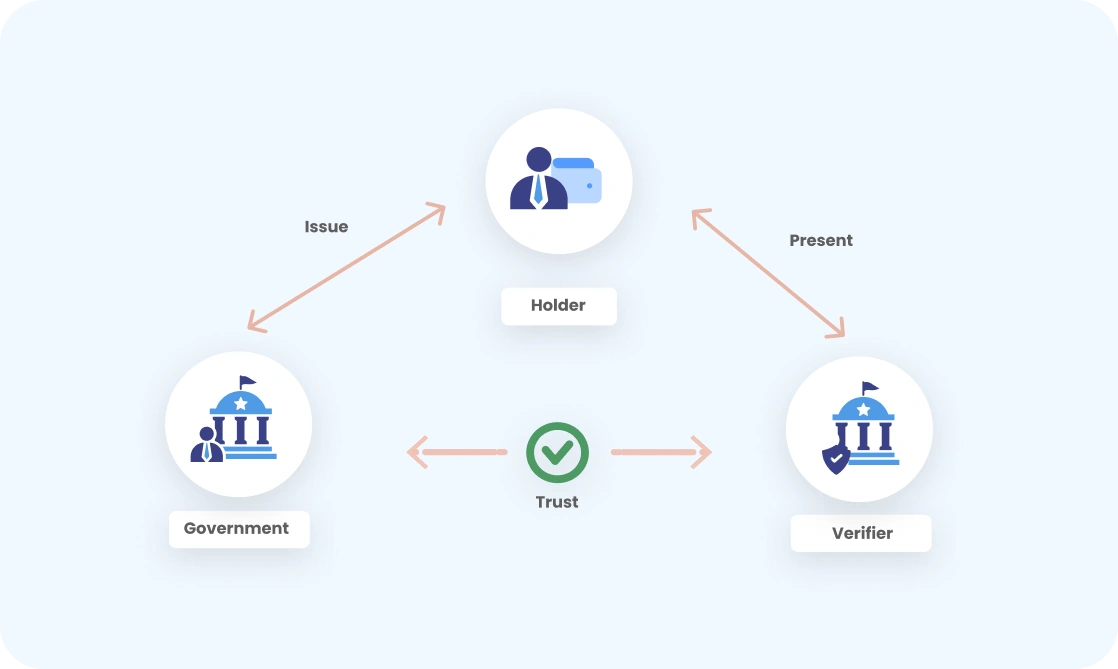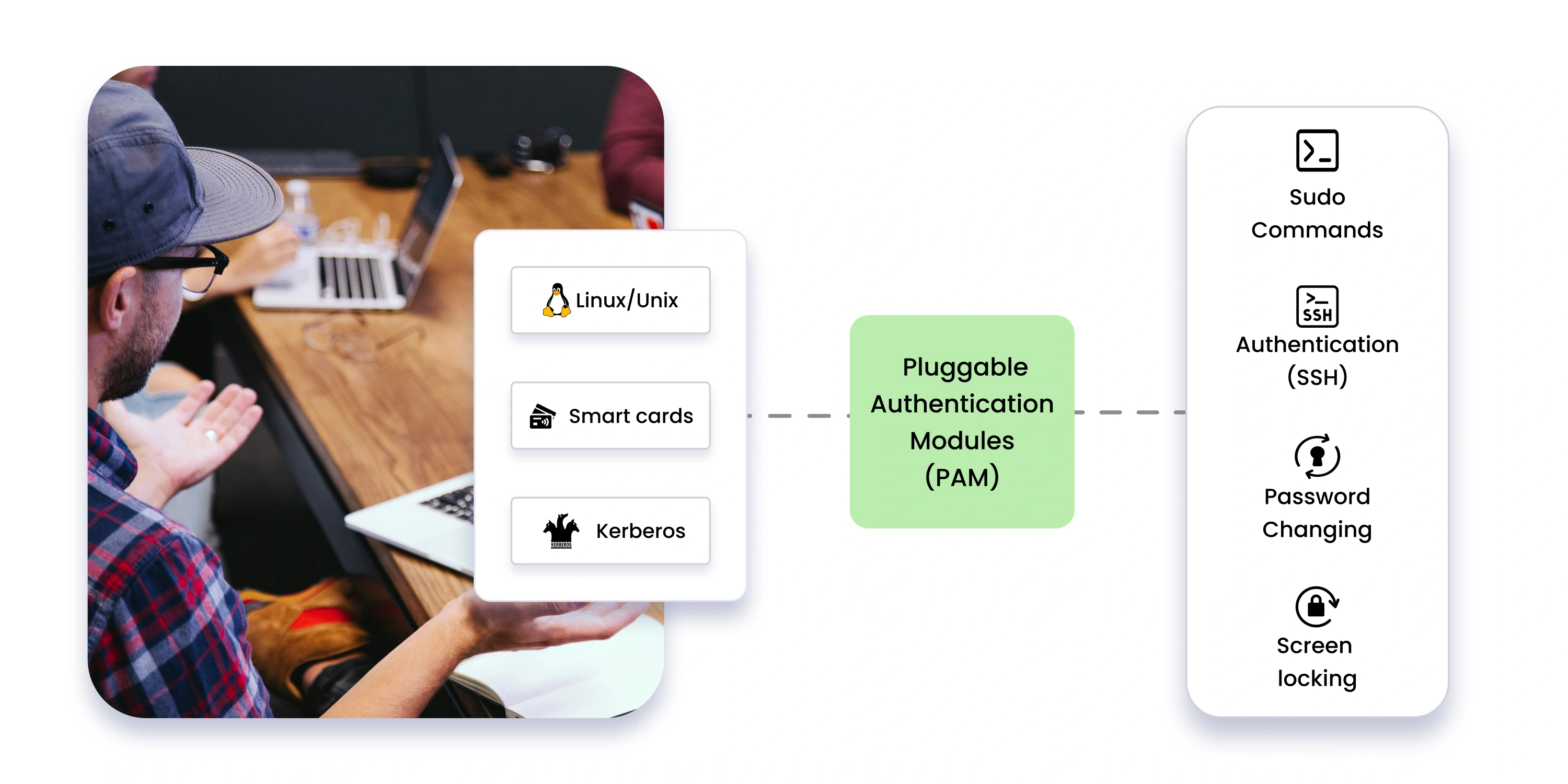If a company or platform holding your personal data is hacked, it can expose your information to misuse.
That’s where decentralized digital identities (DIDs) can help, offering a new model where you, and only you, control your data.
In this blog, we’ll explore how decentralized identity works, its use in private wallets and government-backed wallets, the benefits they offer, and the future of Digital Identity Security.
What is Decentralized Identity?
Imagine storing all your personal information—like your ID, passport details, and credentials—on a digital wallet rather than on social media platforms. That’s the idea behind decentralized identity (DID). It's built on blockchain technology—a secure and transparent system that gives individuals complete ownership of their identity information.
With this system, instead of trusting a third party to manage your identity, you store your credentials in a digital wallet. These wallets, which can either be private or government-backed, allow you to share only the information you choose and prove your identity without compromising your privacy.
How Does Decentralized Identity Work with Private & Government Wallets?
Decentralized identities (DIDs) let individuals fully control their own identity information without depending on a central authority. Let’s break down how it works with both private and government-backed wallets.
1.Private Wallets
Private wallets allow users to create a digital identity that’s securely stored and linked to cryptographic keys. This means people can hold credentials—like diplomas or age verifications—that are digitally signed by trusted sources.
What’s great about private wallets is their “selective disclosure” feature, which lets users share specific information without giving away more than they want. For example, you can prove your age without revealing your birthdate. This approach gives users full control, so they can decide who sees their information and can change access at any time without relying on any one authority.
2. Government-Backed Wallets
Government-backed wallets offer digital identities by connecting to official records, like national IDs. In this case, the government manages the verification process, which boosts trust for services like healthcare, voting, and social benefits.
Users still control who sees their information and can decide what to share. Plus, if they ever need to revoke access to certain information, these wallets have built-in privacy protections to ensure extra data stays private.
Benefits of Decentralized Identities (DIDs)
Decentralized identities (DIDs) aren’t just about keeping your information safe—they’re about boosting privacy, security, convenience, and trust. Here’s a breakdown of the benefits of this new approach to identity:
- You Own Your Data
With DIDs, you’re in charge of your personal data. Instead of scattering your information across various platforms, you keep it all in your digital wallet. When it’s time to share, you only send out the info that’s needed, and you control who sees it. - Stronger Digital ID Security
Decentralized digital identity uses blockchain technology to protect your interactions and transactions. Since your identity is distributed across the network, there’s no single point of vulnerability, which helps prevent the large-scale data breaches often seen in centralized systems. - Say Goodbye to Passwords
With DIDs, you don’t need multiple passwords. Instead, you use cryptographic keys and wallet logins, allowing you to verify your identity across platforms using a single digital wallet—no more juggling credentials! - Less Fraud and Identity Theft
Decentralized ID significantly reduces fraud by relying on verified credentials. Each credential is securely signed and confirmed by trusted sources, like government agencies, making it nearly impossible for anyone to impersonate you. - Building Trust in Government Services
Government wallets built on decentralized digital identity can strengthen trust between citizens and public institutions. People can feel confident that their data won’t be misused or altered without their consent. - Future Ready: Metaverse and Web3
Decentralized ID is essential for the evolving metaverse and Web3. In these virtual environments and decentralized apps, you need a secure way to prove your identity without relying on centralized platforms.
Real-World Uses of Decentralized Identities (DIDs)
- Workplace and Remote Collaboration
As remote work becomes standard, decentralized identity is transforming access management for businesses. With DIDs, organizations can simplify access controls and enhance collaboration security.
For Example: Employees can access company systems and apps using DIDs instead of traditional usernames and passwords. This reduces the risk of password-related security breaches and streamlines access management.
- Government Services
Governments are exploring DIDs to make public services safer and more accessible. By adopting digital wallets for citizens, they can enhance access to services while safeguarding personal data.
For Example: A government-backed decentralized identity wallet can allow citizens to access services like voting, tax filing, or social benefits securely. This method improves efficiency and reduces fraud by ensuring that only eligible individuals access certain services.
- Financial Services
The financial industry is adopting decentralized identity to improve identity verification and reduce fraud. Banks and other institutions can leverage decentralized wallets to simplify customer onboarding while maintaining regulatory compliance.
For Example: During a loan application, a user can share verified credentials, like credit history and income, without disclosing sensitive information. This not only reduces identity theft risk but also speeds up the application process.
Conclusion: Why Decentralized Identity Matters
As our lives become increasingly digital, decentralized identity will be essential in protecting personal information. Whether through private wallets for user-controlled digital footprints or government-supported solutions for added trust, DIDs are paving the way for secure, user-centric identities.
This isn’t just a trend—it’s the future of digital security.
Take the first step toward a more secure digital identity! Contact us today at info@xecurify.com to learn how our Decentralized ID solutions can empower you.





Leave a Comment